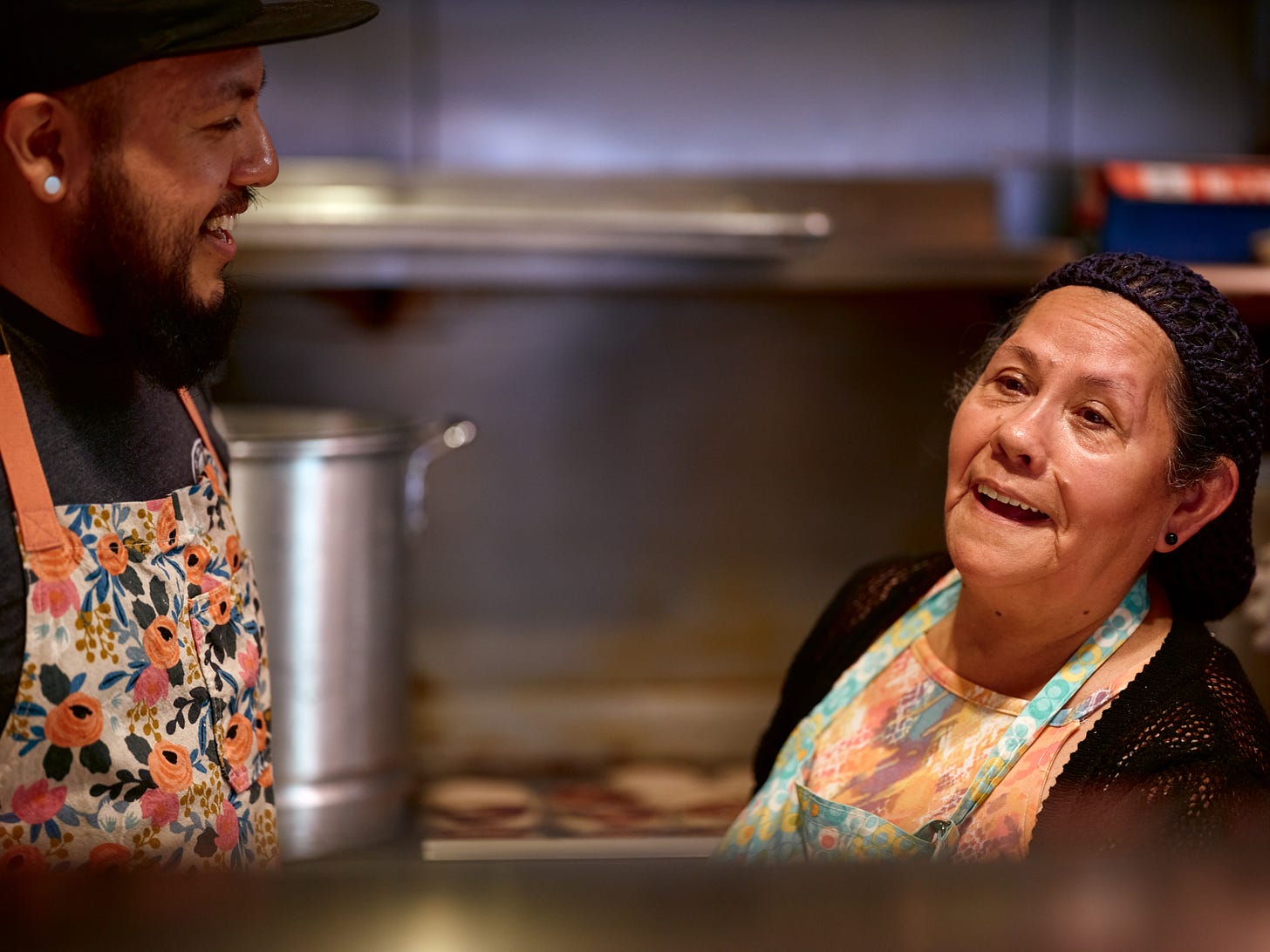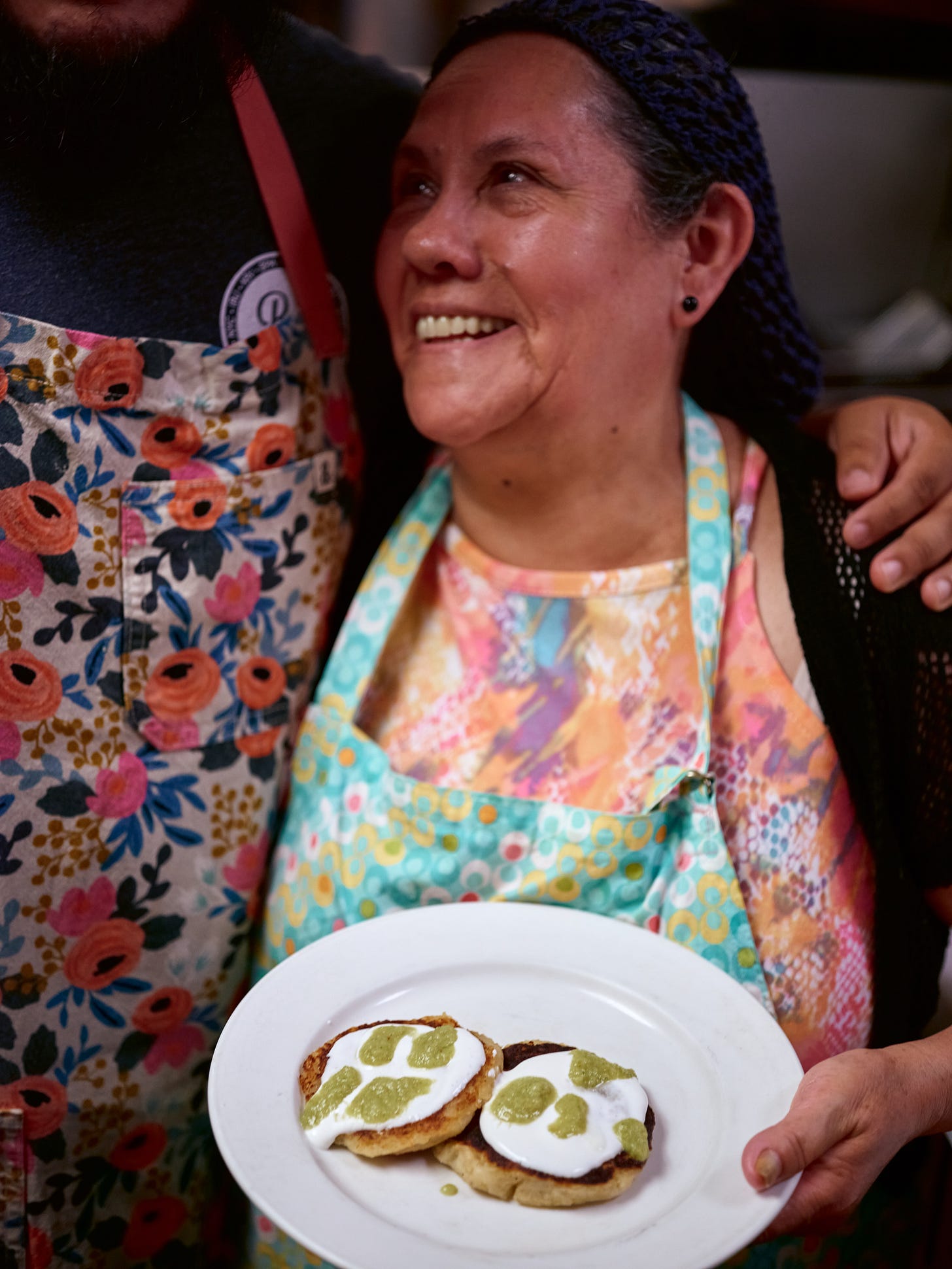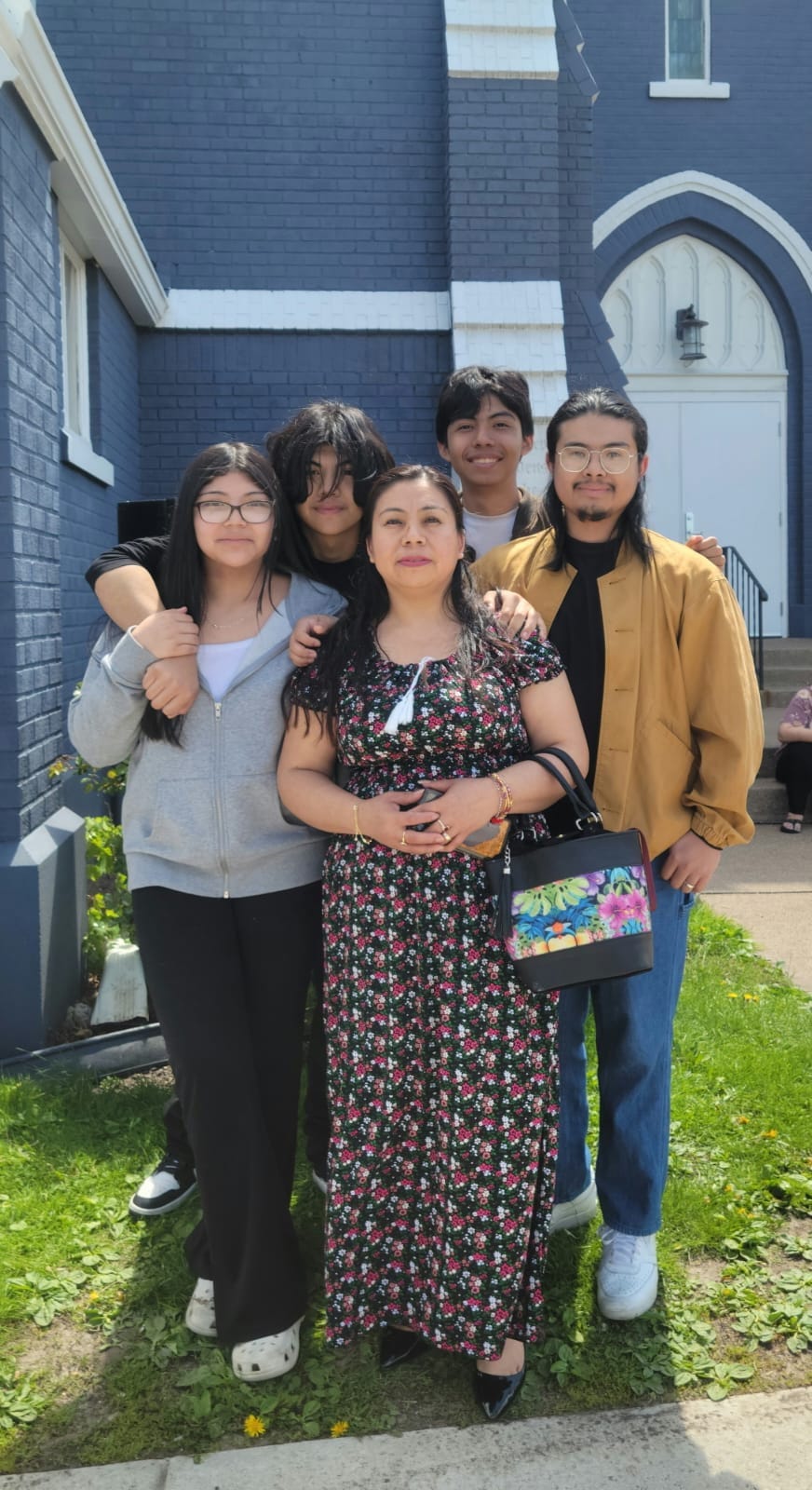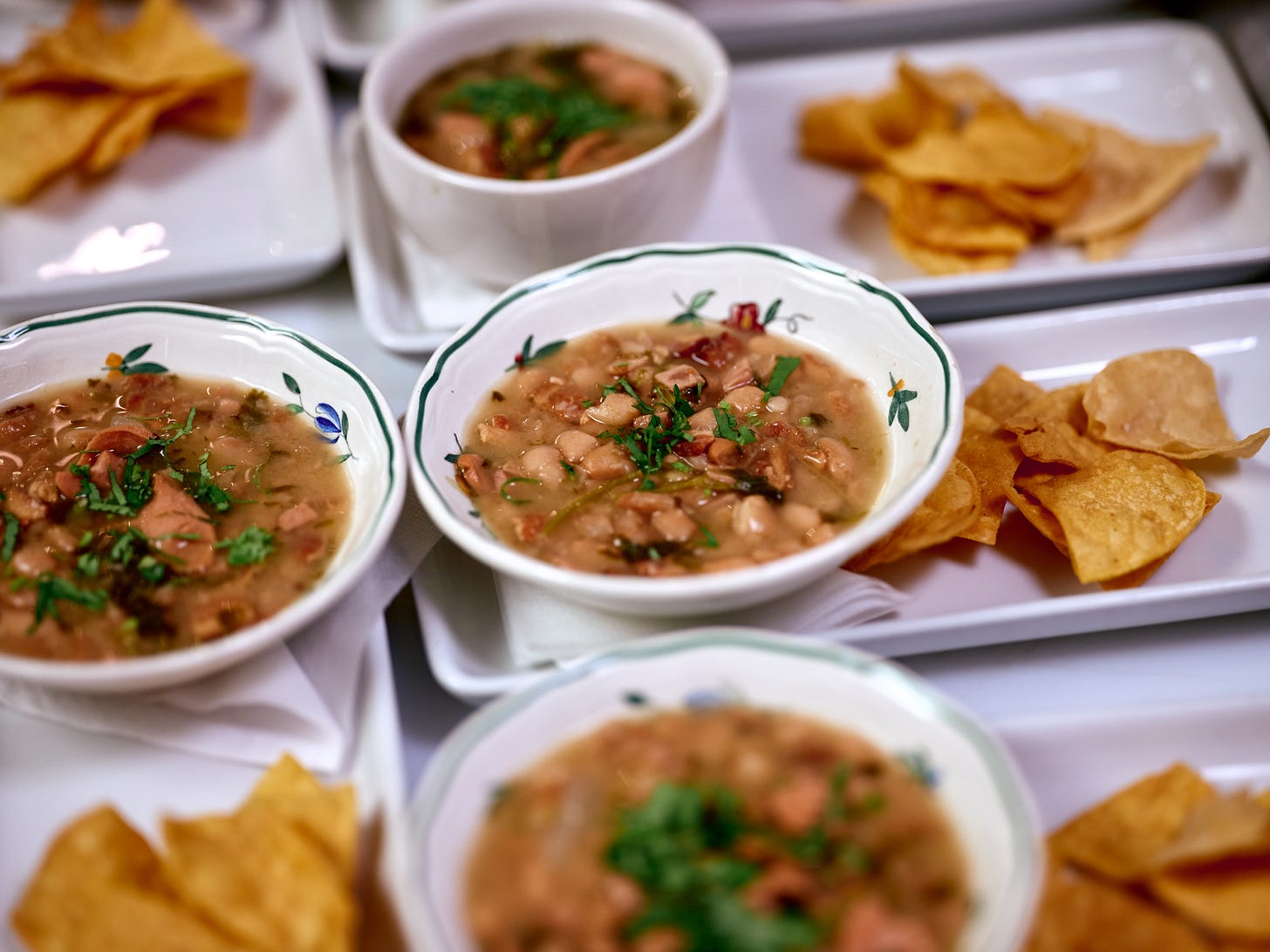Masa Makes Family
Family displacement is all too common in immigration stories — how two Mexican moms keep their sons tethered to home
Earlier this month, we hosted our second ever Immigrant Kitchen dinner at The Harriet Brasserie, featuring mom & son teams Elsa & Jeremy Moran + Areli & Alex Gadea. These are the food and immigration stories they shared with us. Scroll to the bottom for more info on our July Immigrant Kitchen!
Elsa & Jeremy
Herminia Alegre was a tamalera — a woman who cooks and sells tamales in a tianguis, or an open-air market in Mexico City. In spite of the fact that some of the tianguis in Mexico have been operating continuously, without noticeable change since before colonization and dating back to the Aztec empire, Herminia’s status in life is not always thought of highly. Some people may have looked down on his grandmother, Jeremy Moran, her grandson, explains.
Astonishing, since tamales themselves are a Mesoamerican creation, dating back to as early as early as 8000 to 5000 BC. They are a food for all time, for many civilizations, passed down from mother to daughter (and son, as you will see) throughout the ages. They are an edible treasure.
And as it turns out, Hermonia’s very tamales recipe is the ticket to keeping her grandson Jeremy, and likely Jeremy’s son — Hermnia’s great grandson Auri — bound to the Mexico City kitchen, and the family, that neither of them will ever know directly.
Thirty-four years ago, Elsa Moran left her hometown of Mexico City to join her husband in The Bronx. Her mother, Herminia, told her she needed to join him after he had already immigrated to look for work. Elsa was reluctant. Her mother was sick.
Arriving in New York, she remembers the shock of the cold in the US, and the streets being empty, relative to Mexico City. Leaving everything she knew behind with two little boys in tow, she was confused and lonely.
“I had a lot of emotions because I didn’t have my mama. It was a very big change because I was alone with my kids and alone with the kitchen,” Elsa remembers.
One of the first things Elsa thought to do with her loneliness was call her mom to get her tamales recipe. Jeremy then went on to grow up on these tamales, as well as those of other neighborhood ladies in The Bronx who were also tamaleras, like one of his favorites, Dona Rosa.
“Her and my mom would be on the corner, selling tamales just talking and chit-chatting. And all I would hear is ‘Hahahahaha!’ And I would go, ‘There’s my mom.’ And then you would hear ‘Jajajajaja!’ And that’s Dona Rosa. And another laugh, and that’s that other lady. You knew them by their laughs, and it was two blocks away!”
Eventually, Jeremy left The Bronx for the same reason his mom left Mexico City— for a better life and to start a family of his own. When he arrived in Minneapolis with his own shock of cold, his own empty streets, and his own loneliness, his first order of business was calling his mom Elsa to get her tamales recipe.
“When I got interested in food, I didn’t learn Mexican, because mom was always making it.”
Overnight, mom wasn’t around.
Initially, he made a lot of really bad tamales. Elsa was surprised he even wanted to do it, knowing that tamales are made by the many dozens at a time. Initially, Jeremy tried to do it alone — not the way to make tamales. He had to expand his chosen family in order to make them the way they were intended. Elsa was proud. When she returned to Mexico City for the first time 19 years after leaving, her mother had long passed away. Much of what she has left of Herminia’s life and legacy are her dishes.
When money was scarce, Herminia fed her family potato cakes — shaping, griddling, then getting them onto the table with such head-spinning speed that when Elsa decided to make them for her own family, she felt inadequate.
“I don't I don't know how she did it,” Elsa remembers. “I don't know how she did so fast. I always looked at her like, ‘Wow, this lady is some otherworldly creature, because the food's just coming out so fast.”
Eventually, Elsa got it down too.
Elsa wells up when talking about Jeremy wanting to keep her mom’s tamales still working — still mixing the masa just so, filling each with just the right amount, then plying each tamal with fiery salsas, queso, and chiles. Still heartbroken 34 years later that she never got to see her mom again, or even visit her gravesite for 19 years, Elsa is content with her decision to cross the border, though it came with many sacrifices— sacrifices she could have never predicted before leaving.
“I’ve learned the language a little bit, right? And sometimes I go back home, and the other women in the community are like, ‘I don't know how you did it. I don't know how you can do it.’ I feel proud that I can go back and say, ‘You can do it. You can learn. You can educate yourself. You can push forward. You can do things that you don't think are possible.’ Because we can. We're all capable of more than than what we feel like in those moments, not only for ourselves, but for our kids, we can push a little bit better, be a little bit better every single day.”
When people say they cross the border and immigrate “to have a better life,” especially for their children, it’s easy to dismiss this statement with a broad brush. What is often not stated is what gets left behind — the sacrifices, and lifelong wounds people carry in pursuit of that better life.
“The thing that people don't see is and don't understand is that my mom had to make a decision, and that decision was to cross the border with two children to get to this next factor of life,” Jeremy explains, toggling his precocious toddler Auri in one hand while attempting to prep masa with the other, just as Elsa did more than 30 years ago.
“There’s a lot of talk about the border — what it is, and how it can be. And even when people think of the ‘easier’ times of crossing — which is when she came — there was still so much pain and trauma and hurt that happens just to get to the other side. Not to mention getting acclimated to a country when you don't know the language, you can't secure a job to get used to the new community or even try to find some small comforts. All of that had to happen in order for me to be here. She’s still reeling and dealing with all of these things of just crossing a border. She went through it not even understanding what it meant. And when you get here, you're a completely changed person. It doesn't leave you unscathed.”
Sweet, stoic, and exuding a dignified pride, Elsa watches as Auri bounces around the dining room, color crayons gripped in his fist. Soon enough, he’ll be grasping his own tamal. Elsa has recently moved to Minneapolis to live with Jeremy and his wife Laura, who has also been picking up the family cooking.
She’s happy that they’re all now making tamales the way Herminia would have liked — with love, together.
Areli & Alex
Shy, with a wide, toothpaste commercial smile that she passed on to her son Alex, Areli Gadea recalls the Puebla, Mexico she left 23 years ago as one of tight-knit family who enjoyed the tranquility, and beauty of nature.
“The countryside and the rivers, my father hunting and fishing rabbits, fish, and birds for our meals. The roads were dirt— we got around on motorcycles and bikes.”
Always devout as she is now, the family went to church together each Sunday and Tuesday.
And just as tight-knit now, Areli is reluctant to host a dinner without her husband, Roberto, or without repping all of her kids, when I explain that we are staging an event around the theme of moms and sons.
A proud mother of four, Areli emphasizes her role as a wife and mother, from the moment she arrived in the US.
Alex, translating for his mom from Spanish to English:
“When she first got here, she said that she was really confused, because first, she didn’t speak English. She was really curious about what was going to happen because she was freshly married to my dad, and they were staying in a house with my dad and his two brothers and two sisters, and then soon after that, she got pregnant with her oldest son. So she she's never worked at a ‘real’ job here in Minneapolis and St. Paul. My dad has always provided for our family. When she got pregnant, she was [outside of the home] even less, and in the first weeks and months, she really missed Mexico. She still does to this day, but she's thankful for what she has and for what God has blessed her with —her whole family with four kids, three sons and one daughter.”
Areli’s mother, Felipa Velasquez Contreras, passed away in Areli’s absence, and Areli not been able to return to Puebla since since she left, and nor has she been able to see most of the other family members who she left behind. Her kids have never visited or met their family in Mexico. When I ask Areli what kind of a woman Felipa was, Areli becomes emotional and has a difficult time responding — her mom passed away just last year and her grief is still fresh. Roberto steps in:
“We grew up in the same town and she was a great mother. She took care of the family, and I could never say anything bad about her— she was a really nice lady. And when me and Areli started dating, she treated me really good. She accepted me from the first moment. I’m not saying that because she was my mother-in-law. I’m saying it because of what I saw in her— very patient, very relaxed, and someone who was very difficult to trigger to anger.”
Areli learned everything she knows in the kitchen from her mother— scratch tortillas, salsas, the celebration foods they had on the holidays like pozole and tamales, and desserts and candies that Areli says she sadly can’t replicate in the states because she can’t access the right ingredients. This seems like a particularly difficult point for her — the main touchstone she has in staying connected to her mom, and passing those memories to her kids— is through her cooking.
As I have witnessed in all of our work with BIPOC Foodways Alliance and Immigrant Kitchen, when words fail, communication happens through the food.
Areli and Roberto want their kids to know the very difficult reasons they had to leave everything they knew, and everything they loved, behind.
“Over there, people work very different jobs. They work in fields and mines, and they work really hard just to provide for their family.”
There would have been no university for her kids for instance. At 17, Alex is an accomplished guitar player, honing his stylings in the church band, and at Creative Arts Secondary School where he spent part of his high school career.
Still, Areli has mixed feelings about their decision to come, considering the pain of family separation.
”People come her for better opportunities and better pay, but it really stays with you to be somewhere new, missing your family, missing them when they were alive, and there’s no way you can see them.”
What Areli is describing are the impossible choices made by an estimated 123.2 million people last year, for instance, who had to leave their homes globally due to persecution, conflict, violence, human rights violations or “events seriously disturbing public order,” according to the UN Refugee agency.
And while Areli is grateful that she and her family have been able to have a relatively safe and healthy transition, she knows that this is not the case for many, many immigrants.
"There’s been a lot of stories of people getting locked up, people getting robbed, getting violated, getting everything taken away from them, and just getting left with nothing, and it really traumatizes people for the rest of their lives. It can ruin people's lives, literally, for the rest of their lives. We’ve heard many terrible stories.”
When things feel too difficult to talk about, cooking can be a salve. Consider this beautiful project, Recetario Para La Memoria, where Mexican women cook the favorite recipes of their loved ones who have gone missing in order to feel closer to them.
Frijoles Charros was one of the dishes popular in Areli’s family and the part of Puebla where she’s from, where the men worked hard in those fields and in those mines. She says they’re delicious, not too difficult to make, highly nutritious, and inexpensive. Pinto beans stewed with onion, garlic, chili peppers, tomatoes, cilantro, and the cook’s choice of meat, it’s an entire meal when served with chips or tortillas.
“I want my kids to know how difficult it can be back home just to stay alive.” Areli goes on. “I want them to know that my family misses us as much as we miss them, and if there was ever a way we could have visited my mom, she would have taken care of anything we need, and she would have been as happy as ever.”
“I’ve never been disappointed by anything my mom makes,” Alex says, sweetly. His favorite dish is chilaquiles, which Areli also of course learned from her mom, and he says he hovers around the kitchen and snoop on how she does it.
“He’s the one of my kids who gives me the most hugs.”
Areli says the flavors of the things she cooks, even in her own kitchen — and life in general — are very different here than they are in Mexico, and she wants her kids to know that.
“But we came here with one goal in mind, to have better opportunities than we had there, and a better life for our kids.”
The Gadea family runs a food truck together, Gadea’s Tacos.
Note: A Spanish version of this story is available in a separate post.
Trash Queen
A poem by Jeremy Moran dedicated to his mom Elsa
You dance in the trash
Laughing as if you were playing on a sandy beach
Bright sun kissing your cheeks
Twisting and turning with your brothers and sisters
Life perfectly imperfect
Mom turning odds and ends into a perfect meal
Her hands producing magic
Something that made you feel as if life was fine
But you left
With your mothers words
“You have to go”
You held your tears
Rolled the dice
Spread your wings
And took flight
Two little birds nestled under your wings
Showing them lands unknown
Not allowing them to live as a dancer of the trash
They danced on sand
Soft on their feet
Noticeably clean
No longer will you dance on trash again
No longer will you need to pretend that the sand is beneath your feet
You learned a new dance
Smiling
Laughing
Crying the whole way
Never letting the brightness of your future blind you
Never forgetting you were a dancer of the trash
Beautiful in every way
Next week: pre-order tickets for our July 21 Immigrant Kitchen featuring Palestinian cook Safa Abdulareesh, which go on sale here first for our subscribers.
Get yours fast before we start selling to the public!










